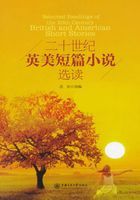
第11章 Elements of Fiction(11)
To understand the function of the point of view we've identified in a story,we need to ask why the author has chosen this particular point of view.An author's choice of a point of view may influence readers'perception of things.Many writers choose to use the first person or limited omniscient point of view,which offers a more limited view of things than the omniscient,to make a point about the limits of human perception.Henry James,for example,often uses the limited omniscient of view to show that people are indifferent,or even blind,to the needs and desires of other people.
4.Theme
Ever since our childhood,we've leant to listen to(or read)stories for not only interesting incidents,but also for the reason why the author tells the story,for the"significance"of the story."刻舟求剑"(to carve a mark on gunwale in a moving boat where a sward was lost)seems to advise us to keep up with the changes of times.Aesop's"The Fox and the Grapes"appears to stress the need to recognize the truth both about oneself and about the world outside.This reason,or significance,is,in literary criticism,called theme—the central idea in the work,the comment the work makes on human condition.The following is Aesop's famous fable"The Fox and the Grapes,"which we will use as an example to clarify the concept of theme.
The Fox and the Grapes
A hungry Fox coming into a vineyard where there hung delicious clusters of ripe Grapes,his mouth watered to be at them;but they were nailed up to a trellis so high,that with all his springing and leaping he could not reach a single bunch.At last,growing tired and disappointed,"Let who will take them!"says he"they are but green and sour;so I'll e'en let them alone."
Theme,first of all,should not be confused with the subject of a work.Subject is what the wok is about and theme is the author's attitude toward the subject.Or,put in another way,theme is the abstract statement that the work makes about a concrete subject.The subject of"The Fox and the Grapes"is,for example,our attitude toward the unattainable(the grapes),and the theme is"we should not justify our own shortcomings by resorting to distortions and lies."
Moreover,theme must apply to people outside the work.For example,it is wrong to say that the theme of"The Fox and the Grapes"is"The fox should not justify his shortcomings by resorting distortions and lies."As we defined earlier that theme is the comment the work makes on human condition,we must state the theme in such a way as to include people in general,not just the characters in the story.A correctly stated theme for"The Fox and the Grapes,"then,would be"Human beings should not justify their own shortcomings by resorting to distortions and lies."By moving from"concrete situations within the work to generalizations about people outside the work,"according to Kelley Griffith,"literature becomes a form of philosophy—wisdom about the nature of reality."(Writing Essays about Literature)
In an essay,an author will try to say as clearly and directly as possible what he or she means.But in a story,an author's goal is to create characters and make them do things,and,ideally,not to say what he or she means."In most cases,"as Pickering and Hoeper put it,"theme is not stated but implied by the work's rendering of experience;it is only gradually revealed through the treatment of character and incident and by the progress and movement of the story."(Concise Companion to Literature)
But how do fictional elements contribute to theme?Before we answer the question,let's first look at how we usually read a literary work in comparison with reading an essay.
Writers write to communicate whatever is real to them,and this reality is their truth.However,the kind of reality,or truth,varies with the form of writing,and from writer to writer.When reading,we are generally concerned with two basic questions.First,what kind of truth,or reality,do we find in the piece we are reading?And second,what are the devices used by the writer to present his or her truth or reality?
Let's first examine a paragraph.
Crime is a violation of criminal law for which formal penalties are applied by some governmental authority.It represents some type of deviation from formal social norms administered by the state.Crimes are divided by law into various categories,depending on the severity of the offense,the age of the offender,the potential punishment that can be levied,and the court which holds jurisdiction over the case.(R.T.Schaefer and R.P.Lamm,Sociology,p35)
What have Schaefer and Lamm done and how have they done it?Their subject is crime and the paragraph is a definition of the nature of crime.To communicate their idea,Schaefer and Lamm use a series of literal,abstract,and declarative sentences;except for the word"hold,"the paragraph is barren of imagery.These sentences are called propositions,statements,as Knickerbocker and Reninger put it,"used to present utilitarian information objectively and impersonally."(Interpreting Literature)
One way to learn why Schaefer and Lamm's writing is called utilitarian is to compare it with a different kind of essay,Bertrand Russell's Portraits from Memory.Here is a paragraph about how to grow old.